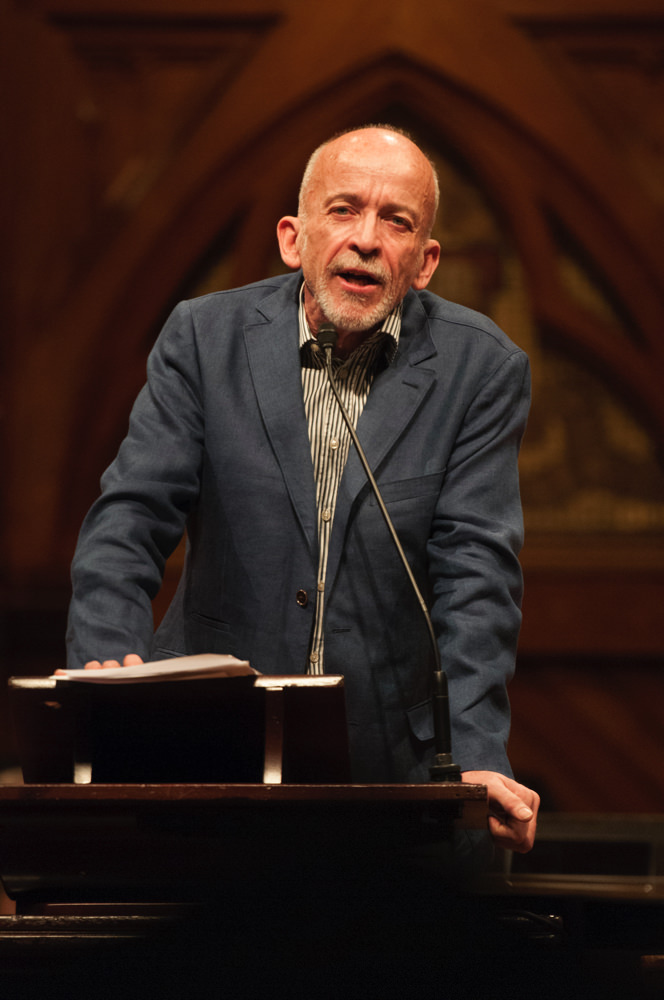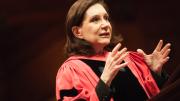Heralded by two musicians in knee-breeches playing fife and drums, graduating seniors and their well-wishers caught the last of the day’s sun as they headed into Sanders Theatre for the 227th Phi Beta Kappa (PBK) Literary Exercises.
Poet Mark Doty and orator Sherry Turkle ’69, Ph.D. ’76 anchored the morning with remarks themed around conscience and connection in turbulent times. Per tradition, this event marks the formal opening of Commencement, and their words seemed to preface this year’s notably political line-up of speakers. Turkle’s address in particular, “How Technology Makes You Forget What You Know About Life,” felt like a deliberate counterweight to the Commencement guest, Mark Zuckerberg ’06, co-founder and CEO of Facebook.
Teaching Prizes
Nominated by the society’s undergraduate members and selected by its undergraduate marshals, teaching awards were presented to:
- Andrew Berry, a lecturer on organismic and evolutionary biology, “a super-sized presence in the classroom,” also said to be “willfully ridiculous when appropriate.”
- Alison Frank Johnson, a professor of history specializing in central and eastern Europe in the modern period, praised for seizing upon opportunities to connect with students, whether in person, over email, “or even by Snapchat.”
- Parimal Patil, a professor of religion and Indian philosophy, whose techniques for guiding students through complex thought include glossaries, hand drawings, and color-coded maps.
Honorary Members
Three College graduates from the fiftieth reunion class were awarded honorary membership:
- Christina Malasch ’67, a professor of psychology at the University of California-Berkeley, best known for devising a research measure for job burnout. As a graduate student at Stanford, she evaluated the Stanford Prison Study and convinced its principal investigator to halt it for ethical reasons.
- Honor Moore ’67, a poet, memoirist, and playwright who teaches creative writing at the New School.
- Douglas Turner ’67, a pioneering researcher on the three-dimensional structure of RNA. Turner is a professor of chemistry at the University of Rochester.

Mark Doty
Photograph by Jim Harrison
The Poet
In a break with recent tradition, the ceremony's poet (and newly-minted honorary PBK member) Mark Doty composed new work for the occasion: 126 lines, delivered conversationally, one hand in suit pocket. In keeping with a presidential administration headed, said Doty, by a real estate developer, the poem “Air Rights” concerns a New York City church that has sold off the space “between their sanctuary and heaven for a cool eight million.” The construction prompts a meditation that ventures to Cairo and Rome before returning to the more recently sedimented shames of American history, like slavery and segregation. He went on:
Do the faithful look upward, their future in a world of like, and more square feet? More power to them, if they do. Down here, where it seems the shadow pooling in the streets grown cooler, gained in depth, sometimes I walk a city block and notice that every single member of our tribe is looking at a screen, or talking to someone who's somewhere else, so that here seems to thin out, dispersed and character-less.
Doty asked in a later verse, quoting the poet Elizabeth Alexander:
We are of interest to each other, are we not?
The evangelical woman, she of the superb hat, will she look down from that glassy paradise and find me of interest? Or the men and women who unroll blankets over flattened cardboard, under Barneys' stainless awning, its steel cloud sheen? They sleep and dream before a chamber gleaming with refusal all night...
I'm all judgment, I know. The congregation won't regret the sale of light and air. And those who sleep on Seventh Avenue, their dreams raked by precious glitter, on the space between their skeletons and the empyrean, no one puts a price...We dwell down here, in shadow and in spring.
The Orator
Sociologist Sherry Turkle began her reflection by recalling her own graduation. In protest of the Vietnam War, she didn’t attend her Phi Beta Kappa exercises—but to keep from upsetting her grandparents, she attended the other ceremonies, wearing a black armband.
“My graduation two-step, my ambivalent, avoidant state of mind, went beyond that day. It extended to how I faced the dark politics of my generation,” Turkle continued. Her generation, the children of those who’d fought the Second World War, grew up with what she called “a right to easy”:
We came to feel that when it was our turn we could do the minimum. I was told so many times growing up that my parents’ generation had saved the world for me, so that I wouldn’t have to.
So after the Vietnam War was over, my cohort was quick to declare victory. We inserted ourselves into a narrative of progress. We allowed ourselves to think that when you win reproductive choice, you win it forever. We took as given the successes of the civil rights movement. Women’s rights, then gay and lesbian rights, we were proud to have all of these in play. We learned to worry about the environment and to teach our children to worry as well. But we didn’t dwell on other things: Profound and growing inequalities of income. Those left behind as the digital divide widened. The deepest legacies of racism. And we also didn’t consider the fragility of our victories. Progressive politics became a profession for professionals. And that seemed efficient. We shaped a world in which when people look for solutions, the first look is often to the efficiencies of technology. Indeed, my generation made our love of the digital technology that came of age with us central to our identity.
The digital revolution’s preferred aesthetic of frictionless expediency, said Turkle, meant that the next generation would have to re-learn life lessons: Political organizing is difficult. Physical presence and solitude are important. Hesitancies and discomfort—“the boring bits”—are natural and essential to human conversation. “But right now,” she said, “when we need it most, to nurture and renew our democracy, we are having trouble listening to each other.”
Turkle concluded:
We need to reclaim what we know about life. When we reclaim our attention, our solitude, and our friendship, we will have a better chance to reclaim our communities, our democracy, and our shared common purpose. We had a love affair with a technology that seemed magical. But like great magic, it worked by commanding our attention and we took our attention off each other. Now we are ready, across the generations, to remember who we are: creatures of history, of deep psychology, of complex relationships, and of conversations artless, risky, and face-to-face. The choice ahead will not be easy, but perhaps neither hard nor easy, but those other opposites of easy: complex, evolved, and demanding. It’s time to make the corrections, and take stock of all the skills we'll need—and of how little technology is going to help us unless we remember all the things we know about life and living.
The envoi was delivered by arts and humanities dean Robin Kelsey, who, following the usual rotation, steps down as head of the chapter this year. Hopi Hoekstra, professor of organismic and evolutionary biology, will succeed him as president, and Francke professor of German art and culture Jeffrey F. Hamburger will serve as vice president.
Another change, unannounced and anti-routine: the Harvard-Radcliffe Collegium Musicum performed the college hymn “Fair Harvard” sans its second verse. Last month, the Presidential Task Force on Inclusion and Belonging announced the launch of a competition to change the lyric reading, “Till the stock of the Puritans die,” and compose a new musical setting that could be performed in electronic, hip-hop, or spoken word styles.









